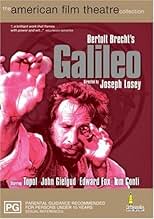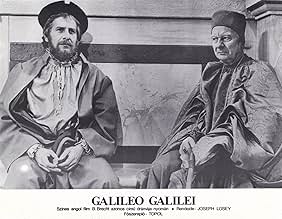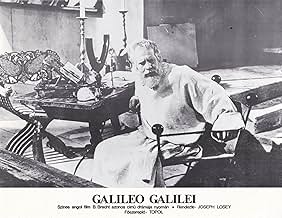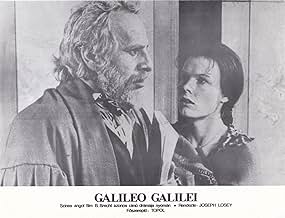यह बायोपिक सत्रहवीं सदी के इतालवी गैलीलियो गैलीली के बारे में है।यह बायोपिक सत्रहवीं सदी के इतालवी गैलीलियो गैलीली के बारे में है।यह बायोपिक सत्रहवीं सदी के इतालवी गैलीलियो गैलीली के बारे में है।
कहानी
क्या आपको पता है
- ट्रिवियाJoseph Losey had also directed the original Broadway production of "Galileo," 28 years previously.
- गूफ़After the crier announces Galileo Galilei's recantation, a chessboard is seen on the left side of the screen: all the pieces are upright. As Galileo enters, a new shot shows that one of the pieces has been toppled. In the next shot, all the pieces are again upright (1:57:50-1:58:10).
- भाव
Andrea Sarti: [upon Galileo's recantation] Unhappy is the land that has no heroes.
Galileo Galilei: Incorrect. Unhappy is the land that *needs* a hero.
- कनेक्शनFeatured in Zomergasten: एपिसोड #23.1 (2010)
फीचर्ड रिव्यू
I wrote a previous comment on the film of Bertolt Brecht's play "Galileo" a few years ago. Since it's posted here I will try not to repeat myself. However, comments from other reviewers need addressing, especially since this film is finally out on DVD and more people may be interested in seeing it. Brecht's intent in this play, which he wrote and rewrote over a period of thirty years, was never intended to be a "biography" of the scientist. Brecht was a Marxist and he saw theatre as a means of propaganda, to jolt viewers out of their complacency, to shake up their way of thinking and their view of the world. How well he succeeded may be open to question, but it is important to understand his intent and point of view. To this end he incorporated what he called the "alienation effect" into his plays. He did not want viewers to get emotionally involved in the characters or experience a catharsis afterward. He wanted to address them directly and tell them that there were important ideas being presented and they should pay attention and think about them. He did not want his audience to be "entertained". If you ever see a production of his "Three-Penny Opera", for instance, the characters come out to the front of the stage and sing little lectures to the audience. The best known tune from this show, "Mack the Knife" is not the swinging jazzy Bobby Darin version, but is supposed to be sung in a grating, irritating voice. This is perhaps the most obvious example of Brecht's alienation effect. In "Galileo" this effect is less apparent, perhaps because this play leans toward the genre of realism more than most of his other plays. It is a rather straightforward, narrative story. In the film the choir boys sing between what would be different scenes in the play. In the play, the lyrics the boys sing are supposed to be on a sign or projected on a screen to bring the tell the audience the year, the place and the general theme of the upcoming scene. Why the producers or director chose to use the choir boys for this purpose, I cannot say and I do think the message get lost in their shrill soprano voices. But for Brecht, this was to be his alienation effect in "Galileo", a break in the action to remind the audience not to get involved in the storyline or the characters, but to pay attention to the ideas he is presenting. I'm pretty sure that the choir boys are in this film to do the same thing, to break up the narrative, to take the focus off the characters in the story, and to communicate the information about the next scene in a way unrelated to the rest of the play. If only they weren't so screechy! One last comment about Brecht & Galileo, the character. I mentioned that Brecht rewrote this play several times, He did this because he was unhappy that actors portrayed Galileo too sympathetically; Brecht wanted him to be a villain, a coward and a betrayer of humanity. Actors, however, were seduced by the slyness and humor of the character. Charles Laughton, who worked with Brecht to translate "Galileo" into English in the late 1940's was among those who couldn't avoid making Galileo likable. Brecht admired Laughton's theatre craftsmanship as they rehearsed the play, but was horrified to find the audience liked the character of Galileo & saw him as a hero instead of a villain. Brecht tried and tried to make Galileo unlikable but never succeeded. Years later, after he have returned to communist East Germany he again tried to make Galileo despicable rather than heroic. But even though he had his own Marxist theatre company in a Marxist country with Marxist actors, his audiences still loved Galileo. It may be the only time a character defeated the author who had created him.
टॉप पसंद
रेटिंग देने के लिए साइन-इन करें और वैयक्तिकृत सुझावों के लिए वॉचलिस्ट करें
- How long is Galileo?Alexa द्वारा संचालित
विवरण
- रिलीज़ की तारीख़
- कंट्री ऑफ़ ओरिजिन
- भाषा
- इस रूप में भी जाना जाता है
- Galileo Galilei
- फ़िल्माने की जगहें
- उत्पादन कंपनियां
- IMDbPro पर और कंपनी क्रेडिट देखें
- चलने की अवधि2 घंटे 25 मिनट
- ध्वनि मिश्रण
- पक्ष अनुपात
- 1.85 : 1
इस पेज में योगदान दें
किसी बदलाव का सुझाव दें या अनुपलब्ध कॉन्टेंट जोड़ें







































